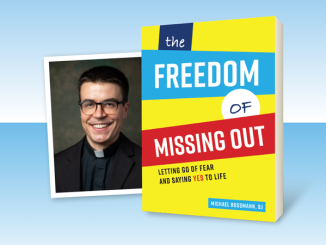
This is part three of a seven-part series on discipleship.
“Just make a decision,” I said to my two children as they were vacillating between two very simple options for dinner. If only all decisions could be so trivial! While some decisions in our life can be very simple, others will be pretty complex. This is especially true when making decisions in relation to our faith.
In the last two parts of this series, we talked about desire and discernment as keys to our growth as disciples. In this part, we will focus on making decisions that help us grow in holiness. At some point in our lives, we recognize more fully that we need to set aside those distractions and habits that lead us away from Christ. These decisions to say no to the things of the world and yes to Jesus Christ are at the heart of our ongoing conversion.
As we strive to live out our faith and become more virtuous faith-filled people, we have to continue to choose to say yes to Christ. This is a lifelong journey for each one of us. These yeses to Christ do not have to be dramatic experiences; they can be decisions made in the silence of the heart. Very often they might be associated with special times in our lives.
One of the most difficult decisions we can make is to conform our lives, truly, to Christ and then mentor and accompany others on their journey toward Christ. Pope Francis called this “the art of accompaniment.” In Evangelii Gaudium, he wrote that “the Church will have to initiate everyone—priests, religious and laity—into this ‘art of accompaniment’ which teaches us to remove our sandals before the sacred ground of the other (cf. Ex 3:5).” (#169) Accompaniment is an art, not an exact science. It looks different to each person and will not progress the same way. It moves along without the constraints of time and depends on the person you are walking with. So, let’s look in more detail at some of the elements of accompanying someone who wants to make a decision for Christ.
- Have courage. If you are feeling apprehensive about accompanying someone, you are not alone. This feeling was shared by the disciples themselves, and Jesus often had to remind them not to be afraid. In this case the maxim is true, “The person who dares wins!”
- Speak plainly and simply. To move others toward a deeper commitment to Christ requires us to speak with others about our personal faith. Remember, faith is personal, but it is not meant to be private. Speak plainly from your heart, and avoid complex terminology or jargon.
- Listen. “Meet people where they are” is a common phrase when discussing accompaniment. This is a call to listen carefully and with empathy. Understand what the person’s daily concerns are, and make them your own. The first step to empathetic listening is being present. Consciously attune your presence to the person you are with, and ask the Lord to guide your conversation so that you can receive what you need to hear, and let the Lord lead your conversation.
- Be open. Accompaniment recognizes that each person brings something of themselves to the conversation, whether as the evangelizer or the one to be evangelized. Both learn from each other, because “where two or three are gathered in my name, I am there among them.” (Matthew 18:20)
Have you ever helped someone make a decision for Christ? How do you accompany others?



![Ascension en el Retablo Mayor de la Catedral del Salvador de Zaragoza - Image by Zarateman (Own work) [CC0], via Wikimedia Commons](https://catechistsjourney.loyolapress.com/wp-content/uploads/2017/05/Ascension.jpg)

Be the first to comment